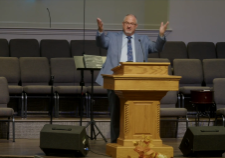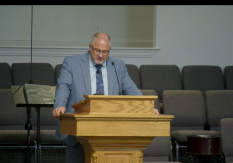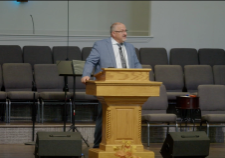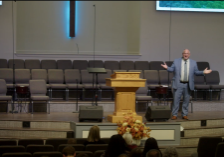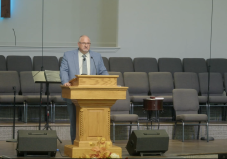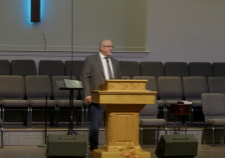Pastor Crawford delves into the teachings of 1 Peter, chapter 3, focusing on the principles of living a blessed life through Christlike behavior. He emphasizes that to inherit a blessing, individuals must embody compassion, unity, and a commitment to doing good, regardless of the circumstances they face. The pastor also highlights the importance of maintaining a positive mindset, refraining from speaking ill, and seeking peace in interactions with others, including those who may oppose them. By embodying these characteristics, believers are encouraged to become blessings to others, reinforcing the idea that a life lived in accordance with God’s principles leads to divine favor. Ultimately, the message calls for a collective effort within the church to uphold these values, thereby fostering a supportive community rooted in love and compassion.
Pastor Crawford engages with the teachings of 1 Peter chapter 3, focusing on the principles that govern a Christian’s life, particularly in the context of relationships and community. He emphasizes the importance of unity among believers, urging them to be of one mind, compassionate, and courteous to one another. The pastor highlights that such characteristics are not only vital for personal growth but are also essential for inheriting God’s blessings. He encourages listeners to refrain from speaking ill and to seek peace, which is a recurring theme in the biblical text. This message serves as a reminder that living a life aligned with these principles leads to a fulfilling and blessed existence, as promised by God. Through his teachings, the pastor draws connections between the actions of believers and the blessings that follow, underscoring a reciprocal relationship between good deeds and divine favor.
Takeaways:
- Pastor Crawford emphasizes the importance of unity among Christians, advocating for selflessness and compassion towards one another.
- He discusses the significance of loving one’s neighbor and providing them with the gospel as the greatest good we can offer.
- The pastor encourages believers to focus on fulfilling the Great Commission by evangelizing and baptizing new converts effectively.
- A key takeaway is the necessity of being courteous and showing kindness to everyone, regardless of personal feelings or past conflicts.
- He outlines that true blessings come from refraining from evil actions and instead responding with kindness, especially to those who may oppose us.
- Pastor Crawford highlights the need for Christians to cultivate compassion, tenderness, and a spirit of humility in their interactions.
Transcript
Song if you wouldn't your Bibles Tonight turn to 1 Peter, chapter 3, a simple Bible study tonight.
Speaker A:As we look at this epistle, we think about Peter writing, giving some basic principles of life here in this particular chapter and principles on marriage and many other things.
Speaker A:One of those again he mentions the word or the phrase to inherit a blessing.
Speaker A:He mentions a phrase that all that will love life and see good days just encourage you as we think about life in general, that God has promised if we do a few things, do these things, that he would bless those that life that he would.
Speaker A:And those who would love life and do good, that God would bless that life.
Speaker A:And so just look at a few principles tonight, a few in particular characteristics of a Christian who is and will be blessed and inherit a blessing.
Speaker A:Look with me again First Peter, chapter three, verse eight.
Speaker A:Finally, be ye all of one mind, having compassion, one of another.
Speaker A:Love as brethren, be pitiful, be courteous, not rendering evil for evil, or railing for railing, but contrariwise, blessing, knowing that ye are thereunto called that ye should inherit a blessing.
Speaker A:For he that will love life and see good days, let him refrain his tongue from evil and his lips that they speak no guile, let him eschew evil and do good, let him seek peace and ensue it.
Speaker A:For the eyes of the Lord are over the righteous and his ears are open unto the prayers, their prayers, but the face of the Lord is against them that do evil.
Speaker A:And he goes on to say that as we do good and we do right, that don't think it's strange that we, you know, encounter those who may be against us and that we may suffer for those things.
Speaker A:He said, happy are you that you suffer for those things when you are living and doing good, right?
Speaker A:Because as you live and do good, God has promised a blessing.
Speaker A:Let's pray.
Speaker A:Heavenly Father, again we pray that you'd be with the message tonight the biblical principles that are instilled here in your word.
Speaker A:And may each of us yield and live according to these principles, Lord.
Speaker A:And the reward of those things ought to be again a motivator for that.
Speaker A:And we'll thank you in Jesus name, Amen.
Speaker A:As we think about again, just some very simple principles found here in the Word of God by Peter.
Speaker A:He speaks there in verse 8 of being of one mind.
Speaker A:And we think about this, we always go back to Philippians, that the Christlike mind is a mind of selflessness.
Speaker A:Let this mind be in you, which is also in Christ Jesus.
Speaker A:And before that verse there in chapter two, Philippians Chapter two.
Speaker A:He talks about that every man should look on the other person's stuff and the other person's life and look out for them.
Speaker A:Look not every man on his own things, but every man also on the things of others.
Speaker A:And we should be looking out for our neighbor.
Speaker A:And when we should be looking out for our fellow brothers and sisters in Christ and looking out for them again, having that one mind together, the selfless mind.
Speaker A:And then he says, having compassion, one of another, having compassion, we ought to have one mind and unity of compassion towards those around us.
Speaker A:Again, our purpose in life is to glorify the Lord.
Speaker A:Our mission in life, our mission in life collectively as a church and individually is to win the lost, to have compassion for our neighbor, to have compassion for them when it comes to sickness and many other things, financial adversity, whatever it may be, but more importantly, to do good for them is to give them the gospel.
Speaker A:The greatest good we can do for our neighbor.
Speaker A:The greatest good we can do for a co worker, the greatest good we can do for a family member is to share the gospel with them.
Speaker A:Do good unto all men, especially those of the household of faith.
Speaker A:Again, focus be of one mind as a church and again, unified together.
Speaker A:He's speaking here of spirit.
Speaker A:How do we stay unified?
Speaker A:And we've talked about this here lately, the last couple of months, and it just seems like it's come up a lot.
Speaker A:And unification of a church is determined by the focus of the church, staying focused.
Speaker A:Our focus, number one, should be on Jesus Christ and glorifying him.
Speaker A:And how do we glorify him?
Speaker A:We glorify him as a church by fulfilling the Great Commission.
Speaker A:And that is to give the gospel to the world.
Speaker A:To go into all the world and preach the gospel to every creature locally, regionally and around the world, and then to baptize them again.
Speaker A:The gospel, the Great Commission, is threefold, and that is to see them get baptized.
Speaker A:When we lead someone to Jesus.
Speaker A:When you give somebody the gospel and they accept him as their Savior, it is your responsibility to make sure that you do your very utmost to see that they make it to the baptismal waters.
Speaker A:Amen.
Speaker A:There should be just as much effort to get them into the baptismal waters as there was to see them get saved.
Speaker A:Because simply to give them the gospel and see them get saved is only one third of the commission.
Speaker A:So if you don't fulfill the rest of it, you have not fulfilled the commission.
Speaker A:Amen.
Speaker A:As a church, we ought to be as determined to see them getting the water as we were Determined to see them get saved.
Speaker A:Help me out.
Speaker A:Because there has been in the past, especially among Baptists, many years, an emphasis upon getting the gospel out, but not near the effort of seeing them baptized and discipled.
Speaker A:And what happens is we just have a lot of baby Christians out there who are floundering, who never got plugged in, who never got put into the church and never got discipled and never got to grow.
Speaker A:We need to be united in our purpose, fulfilling the great commission.
Speaker A:I'm thankful for the McGeorge family, I'm thankful for the Matney family and families that are willing to go to the foreign field and reach folks all around the world with the gospel.
Speaker A:And we need to pray for our missionaries.
Speaker A:And man, there's so much adversity going on today amongst our missionaries and just pray for them.
Speaker A:We have over the years continue to give to missions and give liberally to missions, and I pray that we continue that and that we as a church continue to be mission minded.
Speaker A:And that is the proof of that, is our local outreach.
Speaker A:And we're going to have, by the way, again, we're coming up on a lot of local outreach coming up.
Speaker A:And that is the fall fest and the effort that we put into that.
Speaker A:I had someone again ask me, well, we bring in all those people, what do we do with them?
Speaker A:I said, well, we give them the gospel.
Speaker A:Everybody who comes and walks into the fall fest receives a bag.
Speaker A:And then that bag is literature about the church.
Speaker A:But more importantly, the gospel's in there and they take that bag home with the gospel in it.
Speaker A:And every year, the last few years especially, we've given away around 150 of those bags every year.
Speaker A:We want to reach people with the gospel.
Speaker A:Takes a lot of effort and a lot of time and takes, you know, again, sacrifice on your part to volunteer to be a part of these special efforts.
Speaker A:Friend day coming up in October, we've kind of changed some of those things around and made the activity actually simpler.
Speaker A:But we still want to emphasize bringing people to church and reaching out to the community with the gospel.
Speaker A:I did have brother Tyler, who heads up our door hanger department.
Speaker A:There's a whole department for that.
Speaker A:And as he designed that and we ordered those, we ordered, I think it was 12,500.
Speaker A:I said, we've been doing 10,000 forever and we can do more than that.
Speaker A:We can, we can do more than that.
Speaker A:And so this year we want to see the door hanger, the canvassing our neighborhoods around here.
Speaker A:We want our community to know we're Here.
Speaker A:It's amazing how many people I meet still.
Speaker A:And I have a tendency to talk to people, whether I'm at Dollar General or Walmart, wherever.
Speaker A:I don't go to Walmart.
Speaker A:Yeah, Home Depot.
Speaker A:I went to Walmart the other day.
Speaker A:Brother Matt Pappas was in there.
Speaker A:He manages the Walmart over here in Haslett, and he's one of our trustees.
Speaker A:And I saw him in there and I said, hey, Brother Matt, I just want you to know this is the first time I've been in this Walmart.
Speaker A:My wife will testify in probably a year now.
Speaker A:I will sit out in the parking lot and drop my wife off at the door.
Speaker A:And then she calls me and then I pick her up at the door.
Speaker A:It's cool the way she just walks out with all that stuff.
Speaker A:And then we put it in the car and we go.
Speaker A:It's awesome.
Speaker A:I'm a bad husband, I guess.
Speaker A:But getting the gospel out and every effort to do so, to put the door hangers out, to do more than we've done in the past, being unified in that purpose, this would trickle all the way down to every ministry of the church, whether it's the Sunday school, whether it's master clubs, whatever.
Speaker A:You are involved in that your goal, your main desire is to see the gospel be presented to every person.
Speaker A:I would tell our Sunday school teachers, and I'll remind you again, if you have a visitor in your class, adult teacher, if you have a visitor in your class, every, every Sunday school lesson can be redirected at least a little, and the gospel be given.
Speaker A:If you are a teacher of first grade and up and you have a visitor come in, I would not allow that little kid to leave that classroom without giving the gospel in some form to them.
Speaker A:Amen.
Speaker A:Master clubs the same way if you're teaching in master clubs and you have visitors or kids that you don't know, you ought to take that opportunity to work the gospel in to your lesson.
Speaker A:Because there should not be a lesson that you teach that the gospel could not be worked into.
Speaker A:Amen.
Speaker A:You guys are quiet tonight.
Speaker A:One mind unified together, reaching people with the gospel.
Speaker A:But here, especially speaking about being unified as brothers and sisters in Christ, may we be unified together having compassion.
Speaker A:That word, compassion means sympathy.
Speaker A:Sympathy.
Speaker A:We see this in Christ.
Speaker A:He had compassion.
Speaker A:Some lacking compassion, Jude says, and he had compassion.
Speaker A:He had sympathy for them.
Speaker A:He was touched with them.
Speaker A:To feel with others, to suffer with those that suffer, to feel deeply their hurts as if they were yours.
Speaker A:Compassion, compassion, that is something we have to pray for.
Speaker A:We're not careful, we become jaded.
Speaker A:We just do.
Speaker A:Life has its ups and downs and its twists and turns.
Speaker A:And if we're not careful, we can become callous towards people and we can forget and we can become less sensitive to our neighbor's needs.
Speaker A:We should pray for compassion.
Speaker A:Lord, give me compassion.
Speaker A:I need to.
Speaker A:I find myself in this predicament all the time.
Speaker A:I need compassion.
Speaker A:I need more compassion.
Speaker A:I need the compassion that Jesus Christ felt.
Speaker A:And may we follow his example.
Speaker A:And then brotherly love, brotherly love, giving honor, having compassion, one another, loving love as brethren.
Speaker A:First, John says one of the proofs that we are saved is having a love for brothers and sisters.
Speaker A:I love my brother and talk about him every once in a while because he needs to be talked about.
Speaker A:He's four years older than me, and I do love him, and I love him like a brother.
Speaker A:We don't always agree on everything, but I love him.
Speaker A:He's my brother.
Speaker A:And we need to be reminded again over and over and over again that as Christians, our heavenly Father is the same.
Speaker A:We are brothers and sisters in Christ.
Speaker A:And one of the proofs is first John.
Speaker A:John says in his Epistle Paul that the proof that we're saved is that we do have a love for each other.
Speaker A:That we have a love for each other.
Speaker A:And there's always gonna come times of conflict in families.
Speaker A:If you spend any time with family, there's gonna be conflict here and there.
Speaker A:But maybe we love each other as we ought to.
Speaker A:Love for family is amazing because it overlooks so many things.
Speaker A:Amen.
Speaker A:I overlook a lot of things my brother does or did.
Speaker A:My brother was mean to me.
Speaker A:My brother was really mean to me.
Speaker A:Anybody have an older brother or older sister that's mean to you?
Speaker A:Yeah.
Speaker A:Testify good.
Speaker A:Some of you adults raising your hand.
Speaker A:So we used to have to ride the bus to school.
Speaker A:My brother would beat me up on the bus.
Speaker A:He would beat me up, you say?
Speaker A:Not really.
Speaker A:Yes, beat me up.
Speaker A:Hurt.
Speaker A:I would be crying.
Speaker A:But what was great about my brother is no one else could touch me because he would beat them up.
Speaker A:But I would pester him so badly that he would get so irritated at me.
Speaker A:I had definitely had some issues with hyperness.
Speaker A:And anyway, I dug my own hole many times.
Speaker A:But my brother, you know, again, there was a lot of things growing up.
Speaker A:One time he lied, oh, I'm going to tell that story, and then I'll move on.
Speaker A:So apparently there was a match or something in the back bathroom trash can.
Speaker A:I don't remember exactly the Whole thing.
Speaker A:But my dad began his investigation as to why there had been a fire lit in the back bathroom of the house we grew up in.
Speaker A:And in his investigation, he always goes to the older brother first.
Speaker A:And the older brother is never wrong.
Speaker A:He is the sage of the family.
Speaker A:My brother said I did not do it, but Eric did.
Speaker A:And I got the whipping of a lifetime for that.
Speaker A:I told dad I didn't do it.
Speaker A:And it was years later that my brother finally confessed to doing it.
Speaker A:I just thought you might feel sorry for me now.
Speaker A:I love my brother.
Speaker A:We had a great time growing up for the most part, and we have a great time now.
Speaker A:Having a love for the brethren means you do overlook.
Speaker A:Love hides a multitude of sins.
Speaker A:Having a love for each other, brethren, we ought to love one another.
Speaker A:Sisters ought to love each other.
Speaker A:Remember that we're family.
Speaker A:That's why even in some of my letters to the church and many times when I refer to our services tonight, I'm thankful to be with our church family because that's what we are, family.
Speaker A:Love for the brethren and then pitiful.
Speaker A:Pitiful.
Speaker A:The word pitiful here means tenderhearted.
Speaker A:So as you think about dealing in our dealings with our fellow Christians, that we need to have compassion and love for each other and we need to be tender hearted towards each other.
Speaker A:Tender hearted?
Speaker A:Are you tender hearted?
Speaker A:That word tenderhearted means sensitive.
Speaker A:It means affectionate.
Speaker A:We need to be sensitive to each other.
Speaker A:People are our people.
Speaker A:And I have learned over the years I'm still not that good at reading people or determining their type of personality per se, especially unless I spend a lot of time with someone.
Speaker A:But we ought to be tender hearted, no matter their personality.
Speaker A:We ought to be tender hearted and sensitive and affectionate towards them, no matter their attitude.
Speaker A:I found it interesting, as I was looking for illustration of this, that the Roman Empire was not tenderhearted.
Speaker A:Do you realize the Roman Empire had no rest homes in the Roman Empire?
Speaker A:There were no assisted living homes in the Roman Empire.
Speaker A:There was no net for those who could not make it.
Speaker A:For those who were physically unable to make it.
Speaker A:There was no public education.
Speaker A:There was no help for the disabled.
Speaker A:There was no compassion or tenderhearted.
Speaker A:There was no sensitivity to those things.
Speaker A:But I would tell you that Jesus was sensitive towards it.
Speaker A:He was sensitive towards it.
Speaker A:Touched and healed the lame.
Speaker A:Touched a leper.
Speaker A:Oh, Jesus was sensitive towards it.
Speaker A:He had compassion sensitivity towards those who could not help themselves rise up and walk.
Speaker A:Did Jesus have to do any of those things?
Speaker A:No, he didn't have to do any of those.
Speaker A:Things, but that's who he is.
Speaker A:That's God.
Speaker A:And I'll remind you, when we see Jesus and his actions, that's God.
Speaker A:You say, well, how would God.
Speaker A:How would God react to that?
Speaker A:Or how would God do that?
Speaker A:Or, well, watch the life of Jesus.
Speaker A:That's how God would do it.
Speaker A:That's how sensitive God is.
Speaker A:That's how compassionate God is.
Speaker A:And by the way, he's the same today, yesterday, and forever.
Speaker A:Praise the Lord.
Speaker A:Right.
Speaker A:That same compassion we see in the life of Jesus, that's the same compassion that God has for us now.
Speaker A:And that tenderheartedness we should exhibit in our own lives, being sensitive to those around us.
Speaker A:And then number five is being courteous.
Speaker A:Courteous just simply means to be friendly, be friendly.
Speaker A:As Christians, we ought to be friendly.
Speaker A:Just ought to be say, well, that's not my personality.
Speaker A:I didn't write the book.
Speaker A:It says to be courteous, be friendly, show thoughtfulness.
Speaker A:The opposite.
Speaker A:It would be rude.
Speaker A:Did you ever just meet anybody?
Speaker A:Somebody who was just rude?
Speaker A:I'm like, seriously, you can't be from Texas.
Speaker A:I do that all the time in my brain.
Speaker A:My wife.
Speaker A:And I'll say it out loud if my wife's around.
Speaker A:You can't be rude like that, be raised in Texas.
Speaker A:We don't raise our children like that.
Speaker A:We shouldn't.
Speaker A:A lot of rude people today, we ought to, again, be courteous to those around us and on our end.
Speaker A:It has to do with having a humble spirit.
Speaker A:In other words, if I'm being rude to somebody, it means I.
Speaker A:In reality, it means I'm better than them, you know, in other words, maybe they're in line in front of me and I'm rude and I cut or whatever.
Speaker A:I don't know, means I'm more important than them or my time is more important than their time or whatever it is.
Speaker A:I'm not being courteous.
Speaker A:I know I say this enough, but I'll say it again.
Speaker A:If you live in Texas and you have come here from another state and you weren't taught to wave at people when they wave at you, wave at people.
Speaker A:Right.
Speaker A:We say, I have no idea who they are.
Speaker A:It doesn't matter.
Speaker A:You're in Texas.
Speaker A:Yeah.
Speaker A:If you're walking in the mall and somebody says hi to you, we ought to be courteous and say, hi back.
Speaker A:Howdy.
Speaker A:Howdy.
Speaker A:We ought to teach our children to be courteous.
Speaker A:Yeah.
Speaker A:And not to be rude.
Speaker A:Friendly.
Speaker A:You say, well, that's your personality.
Speaker A:You're a preacher.
Speaker A:You have to be friendly.
Speaker A:No, I didn't write the book.
Speaker A:It says we ought to all be courteous.
Speaker A:See, you don't have to be as you know, bouncing up and down like I do.
Speaker A:I told you all the elevator story.
Speaker A:I won't go into those things.
Speaker A:But just being courteous, being kind to people around you, having that humbleness, a spirit of lowliness.
Speaker A:By the way, that's the spirit of Jesus.
Speaker A:Lowly, meek, mild, by the way, meekness is not weakness.
Speaker A:Jesus Christ went to the temple and turned over the money chambers tables and took a whip and drove them out of the temple.
Speaker A:And yet he was meek.
Speaker A:Meekness is not weakness.
Speaker A:Meekness is just being under control.
Speaker A:Being under control.
Speaker A:And then verse nine, not rendering evil for evil or railing for railing, but contrariwise, blessing.
Speaker A:Blessing.
Speaker A:So again towards others.
Speaker A:And this has to do more with our enemies.
Speaker A:Again, Jesus made it very plain that we should love our enemies.
Speaker A:The only way we can do that is through the grace of God.
Speaker A:You can't love your enemies or those who have despitefully used you unless you experience and know the grace of God.
Speaker A:By the way, the Bible says, pray for those who despitefully use you.
Speaker A:We ought to again be kind and gracious not only to those who are kind and gracious to us, but kind and gracious to those who are not kind and gracious to us.
Speaker A:Amen.
Speaker A:That's what the Bible's saying.
Speaker A:And the Holy Spirit has to guide us and empower us to do so.
Speaker A:And the Bible says if we'll do that, that we'll be blessed.
Speaker A:The reward for not rendering evil for evil, the reward for not rendering railing for railing is that you or ye usin should inherit a blessing.
Speaker A:You want a bless.
Speaker A:Treat even your enemies as you would treat yourself.
Speaker A:Render evil.
Speaker A:Render good for evil.
Speaker A:Rendering evil for good is satanic.
Speaker A:Rendering good for good is the flesh.
Speaker A:Anybody can do that.
Speaker A:But rendering evil for evil is wrong.
Speaker A:But good for evil, that's Jesus.
Speaker A:That's the Holy Spirit.
Speaker A:Let me say it this way.
Speaker A:That's being a Christian.
Speaker A:That's being a Christian years ago, I We have preached on forgiveness many, many times.
Speaker A:We did a series on it.
Speaker A:Hasn't been too long ago, maybe three or four years ago.
Speaker A:And that we ought to forgive others as Christ forgave us.
Speaker A:And as we deal with those who we have who have offended us, we deal with those who have treated us wrong.
Speaker A:Or at least on R.E.M.
Speaker A:we believe that.
Speaker A:And you know, and if you believe it, then it needs to be taken care of.
Speaker A:The best thing you can do for someone whom you're having a hard time forgiving the best thing you can do for someone who you would consider maybe again your enemy.
Speaker A:The best thing you can do for them is to pray for them.
Speaker A:And I don't mean like, Lord, I hope that you will, you know, you will be like David as David had prayed and rain down fire upon them and brimstone and Lord, just wipe them out.
Speaker A:No, don't pray like that.
Speaker A:But we should pray for them.
Speaker A:We should pray for them like we pray for our own family.
Speaker A:Pray for them.
Speaker A:Another thing, the Bible, the biblical principle, and I gave this to you.
Speaker A:It's been several years ago.
Speaker A:Many times doing something for them, you just have to look for an opportunity.
Speaker A:But many times when you have an odd against someone and you've prayed for them and you're praying God to help you to find forgiveness and have forgiveness for them, you're praying that God would again give you compassion for them.
Speaker A:Many times, especially in big circumstances, maybe again giving them something, doing something for them on your end, you won't believe what that'll do for you.
Speaker A:If you do it in the right spirit, of course, not like, okay, I gave you this, I feel so much better.
Speaker A:No, it's as you praying for them, as you're asking for the grace of God and you do something for them, whether it's something you, you know, tangible or whatever it may be, maybe it's a letter, maybe it's an email, whatever it may be.
Speaker A:But if you're struggling with someone, you're struggling getting along with someone, especially a brother or sister in Christ, pray for them.
Speaker A:And then many times again, doing something good for them, doing something good for them, whatever that may be.
Speaker A:One time I was struggling with an individual and they needed to borrow something, they borrowed something.
Speaker A:And I said, well, by the way, the Bible says when you let somebody borrow something, you need to just kind of act like it may never come back.
Speaker A:But in this case I was like, no, you can just have it.
Speaker A:And I'd been praying for this individual and I remember again the load being lifted when I did that.
Speaker A:In that particular circumstance, in that particular instance, it was the act of giving to them that enabled me to let go.
Speaker A:I can't tell you why or how.
Speaker A:I just know I'm thankful for the grace of God.
Speaker A:Pray for them.
Speaker A:Pray for them.
Speaker A:We are not to render evil for evil.
Speaker A:It's not our place to seek revenge.
Speaker A:It's our place to have compassion and be courteous, to be tender hearted and be kind, to be sensitive towards those around us.
Speaker A:And be of one mind to love our brothers and sisters in Christ and then to love our enemies.
Speaker A:And what's the result?
Speaker A:Well, again, not rendering evil for evil or railing for railing, but contrariwise, blessing.
Speaker A:Be a blessing to them, knowing that ye are thereunto called that what ye should inherit a blessing.
Speaker A:For he that will love life and see good days, let him refrain his tongue from evil and his lips that they speak no guile.
Speaker A:We won't go into the rest of there.
Speaker A:But again, you want a blessing?
Speaker A:You want a blessing?
Speaker A:Be a blessing.
Speaker A:Be a blessing to those around you as Christ would be a blessing to those around him.
Speaker A:Even those who may consider your enemies.
Speaker A:Be a blessing to them.
Speaker A:Heap coals of fire on their head.
Speaker A:I'm telling you, God could do much more with the person you have an odd against than you can.
Speaker A:And it's still funny to me how we.
Speaker A:I still do this too.
Speaker A:It's funny how so many times it's hurting you more than it's hurting that person.
Speaker A:Sometimes they don't even know there's a problem.
Speaker A:Boy, give that to the Lord.
Speaker A:Be a blessing to them.
Speaker A:In verse 12, he speaks about hearing our prayers, those that do good and those who live righteously.
Speaker A:God will hear our pray.
Speaker A:I'm thankful that God still answers prayers that he hears the prayer of the righteous.
Speaker A:It says, and then being Christlike, being and living the Christ life will bring about blessing in your life.
Speaker A:You'll say, well, I have to do all these things.
Speaker A:You know, again, doing all those things that the Bible encourages to do or not do doesn't equate to spiritualness.
Speaker A:It only puts us in a position where the Lord can make us spiritual because we can do things for others and have the wrong motives.
Speaker A:But as we do for others and as we are a blessing to others and we pray and we have the right motives, God will just pour out a blessing on you.
Speaker A:God will give you a river of blessings.
Speaker A:And God will give you a softer heart.
Speaker A:God will give you compassion.
Speaker A:God will help you to be courteous with those who are not very.
Speaker A:You ever wanted just to do something to a rude person like be rude back?
Speaker A:No.
Speaker A:God will give you the grace you need to handle those situations, especially when it comes to the family of God.
Speaker A:When it comes to our brothers and sisters in Christ, let's all stand.
Notice a problem?
Our sermon archive represents hundreds of hours of cataloging and dedication by staff and volunteers, but we do not always get things right. Report wrong preachers, titles, or mismatched videos here.

